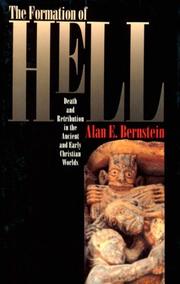Check nearby libraries
Buy this book

What becomes of the wicked? Hell - exile from God, subjection to fire, worms, and darkness - for centuries the idea has shaped the dread of malefactors, the solace of victims, and the deterrence of believers. Although we may associate the notion of hell with Christian beliefs, its gradual emergence depended on conflicting notions that pervaded the Mediterranean world more than a millennium before the birth of Christ: Asking just why and how belief in hell arose, Alan E.
Bernstein takes us back to those times and offers us a comparative view of the philosophy, poetry, folklore, myth, and theology of that formative age.
Bernstein draws on sources from ancient Egypt, Mesopotamia, Greece, Rome, and Israel, as well as early Christian writings through Augustine, in order to reconstruct the story of the prophets, priests, poets, and charismatic leaders who fashioned concepts of hell from an array of perspectives on death and justice.
The author traces hell's formation through close readings of works including the epics of Homer and Virgil, the satires of Lucian, the dialogues of Plato and Plutarch, the legends of Enoch, the confessions of the Psalms, the prophecies of Isaiah, Ezekiel, and Daniel, and the parables of Jesus.
Re-enacting lively debates about the nature of hell which were argued among the common people and the elites of diverse religious traditions, he provides new insight into the social implications and the psychological consequences of different visions of the afterlife.
Check nearby libraries
Buy this book

Previews available in: English
Subjects
Biblical teaching, Christianity, Comparative studies, Doctrines, Hell, History, History of doctrines, Judaism, Nonfiction, Religion, Histoire des doctrines, Vie future, Klassieke oudheid, Aspect religieux, Enfer, Literatur, Mort, Punition, Antike, Hel, Hölle, Vroege kerk, Judaïsme, Theologie, Enseignement biblique, Histoire, Religion romaine, Geschichte 30-600, Études comparatives, Christianisme, Rome, religion, Judaism, doctrines, Future punishment, Death, religious aspects, Christianity, early church, ca. 30-600, Roman mythologyPlaces
RomeTimes
Early church, ca. 30-600Book Details
Edition Notes
Includes bibliographical references (p. 343-365) and indexes.
Classifications
The Physical Object
ID Numbers
Source records
Internet Archive item recordLibrary of Congress MARC record
Internet Archive item record
marc_evangelical_seminary MARC record
Better World Books record
Library of Congress MARC record
amazon.com record
marc_scms MARC record
marc_columbia MARC record
marc_columbia MARC record
Work Description
From the author of "The Devil: Perceptions of Evil from Antiquity to Primitive Christianity", this book examines a central theme in Western Culture: The Centuries-Old Notion Of Hell - Exile From God, Subjection To fire, worms and darkness. In this study, Alan Bernstein investigates just How And Why Belief In Hell Arose. Although We May Associate The Notion Of hell with Christian beliefs, its gradual emergence depended on Conflicting Notions That Pervaded The Mediterranean World More Than A millennium before the birth of Christ. Bernstein takes us back to those times and offers us a view of the philosophy, poetry, folklore, myth and theology of that formative age.; Drawing on sources from ancient Egypt, Mesopotamia, Greece, Rome and Israel, as well as early Christian writings, the author reconstructs the story of the prophets, priests and poets who fashioned concepts of hell from an array of perspectives on death and justice. The author traces hell's formation through close readings of works including the epics of Homer and Virgil, the satires of Lucian, the dialogues of Plato and Plutarch, the legends of Enoch, the confessions of the Psalms, the prophecies of Isaiah, Ezechiel and Daniel and the parables of Jesus. Re-enacting debates about the nature of hell among the common people and the elites of diverse religious traditions, he provides new insight into the social implications and the psychological consequences of different visions of the afterlife. This book aims to captivate readers interested in history, mythology. literature, psychology, philosophy and religion. It should be of use to ancient historians, classicists, theologists, and cultural historians.
Community Reviews (0)
Feedback?History
- Created April 1, 2008
- 18 revisions
Wikipedia citation
×CloseCopy and paste this code into your Wikipedia page. Need help?
| July 24, 2024 | Edited by MARC Bot | import existing book |
| January 10, 2023 | Edited by MARC Bot | import existing book |
| November 16, 2022 | Edited by MARC Bot | import existing book |
| November 11, 2022 | Edited by MARC Bot | import existing book |
| April 1, 2008 | Created by an anonymous user | Imported from Scriblio MARC record |


















